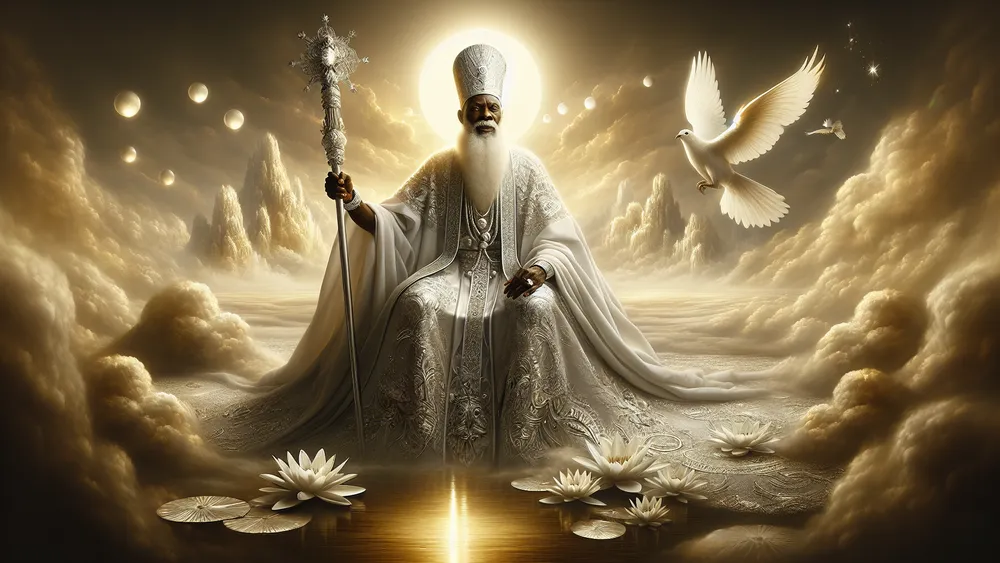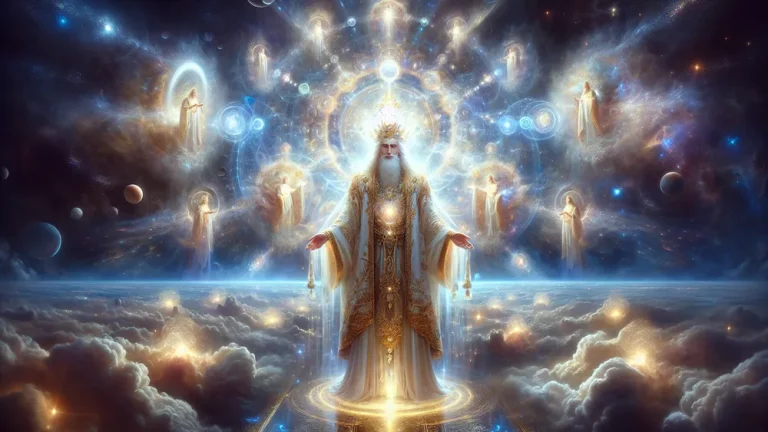Obatala: The Yoruba Orisha Of Creation And Purity
In Yoruba beliefs, few figures are as highly respected or as hard to fully grasp as Obatala, the god linked to making things, knowing much, and being clean. Picture a god who shaped humans out of clay – only to make mistakes, teaching lessons that stay true about being humble and not being perfect.
Key Points:
- Obatala is the Yoruba god of making things, wisdom, and being clean, often called King of the White Cloth.
- He shaped humans from clay but messed up when drunk, leading to some being born with disabilities, which is why he protects them now.
- White cloth, silver, and snails are his main symbols, meaning purity, wisdom, and patience.
- Stories differ on whether he worked alone or with Oduduwa to create humans, causing disagreements in Yoruba tales.
- After his mistake, he lost his place as sky king, stopped drinking, and became wiser and kinder.
- Followers honor him with white foods, coconut water, and silver, while avoiding alcohol and lies.
- Yearly festivals include cleaning rites, wearing white, and sharing white meals to ask for wisdom and clear thinking.
People have told Obatala’s stories for ages, and they bring together ideas about making things, falling from grace, and making things right, which lets us see how deeply the Yoruba people think. Much like how Zeus stands in Greek tales or Vishnu does in Hinduism, Obatala isn’t just a god. He is an important part of their culture. But not all stories agree.
Some say he was the only one who made humans, while others tell of a fight with Oduduwa over who really did it. Here, we will look at these layers, including his signs (like white cloth, which means spiritual clearness), special customs, and long-lasting impact. Whether you’re just starting with myths or want to dig deeper, Obatala’s legacy gives a clear way to understand Yoruba spirituality.
Obatala: Overview and Key Facts
| Category | Details |
|---|---|
| Role | Creator god and Orisha of cleanliness, wisdom, and peace. People sometimes name him “Sky Father” or “King of the White Cloth.” In some tales he forms humans from clay while in others he splits the work with Oduduwa, depending on which place the story comes from. |
| Symbols | – White cloth: Stands for cleanliness, clear thinking, and spirit washing (like starting fresh in spirit).<br>- Silver: Tied to how wise he is and his holy power.<br>- Snails: Mean being patient and making things slowly, with much care. |
| Sacred Animals | – Doves: Stand for peace and his calm way.<br>- Elephants (in some beliefs): Mean strength that gets balanced by wisdom. |
| Key Myths | – Making Humans: Obatala shapes people from clay but messes up because he drank too much (a story that warns about too much pride).<br>- Fight with Oduduwa: Some tales tell of arguing over who finished making things (changes by area).<br>- Losing Power: He lost his place as sky king because he messed up, but later made things right. |
| Traits | – Kind: Looks after those with disabilities (because he didn’t make things perfectly).<br>- Not drinking: Later stories stress avoiding alcohol after his mistake.<br>- Fair: Helps solve fights between Orishas and people. |
| Worship | – Gifts: White foods (like coconut, rice), clear water, and silver things.<br>- Things not allowed: Alcohol and lying (which goes back to what happened in his stories).<br>- Events: Yearly gatherings where people do cleaning rites and wear white clothes (more on this later). |
The Stories Behind Obatala
Within the Yoruba tradition lives on Obatala’s lasting mark through detailed accounts people still tell about how things began and how he fell from grace before making good, and we will examine them piece by piece. These matter much.
Obatala and How Humans Were Made
What the stories agree on is that Obatala formed the first people from clay. Most tellings say the high god Olodumare told Obatala to make human bodies while he would give the life force, but Obatala drank palm wine during the work and got drunk, and like when hands shake while making pots, his people came out wrong – some with disabilities or unusual shapes.
When sober, Obatala felt terrible and quit drinking for good, becoming the protector of those with bodily differences. Coming from different cities are changed versions, especially about Oduduwa. Some say Oduduwa finished the job when Obatala failed, taking over making proper humans. Others have them working together, or claim Oduduwa stole the clay. This fighting matches up with real disagreements among Yoruba towns long ago, each lifting up their own god.
Similar god battles exist elsewhere, like Greek Titans fighting Olympians.
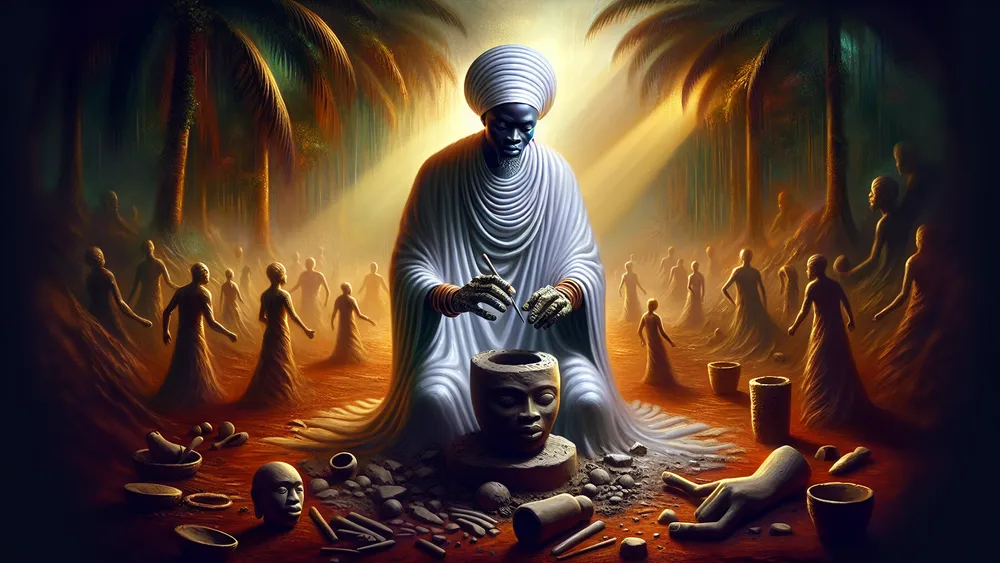
From this story come important lessons:
- Why getting drunk is bad: Obatala’s error lets us see how drink weakens thinking
- Knowing your limits: Even gods can’t do everything right
- Accepting differences: Explains why people vary while saying all matter
- Fixing mistakes: Obatala owned up to what went wrong
- Working together: Needed both Obatala’s clay and Olodumare’s life force
Obatala shaped the first humans from clay but messed up when drunk, leading to disabilities, so he stopped drinking and became their protector, while different versions blame or praise Oduduwa for finishing the job.
Obatala’s Downfall and Exile
Obatala’s time as sky king ended suddenly because of his creation mistakes, though stories differ. What we know for sure is some say his drunkenness making humans got him removed from power right away, while others tell of Olodumare slowly stopping to trust him. Much like when leaders get fired for mistakes, he lost his heavenly power and went to live on Earth.
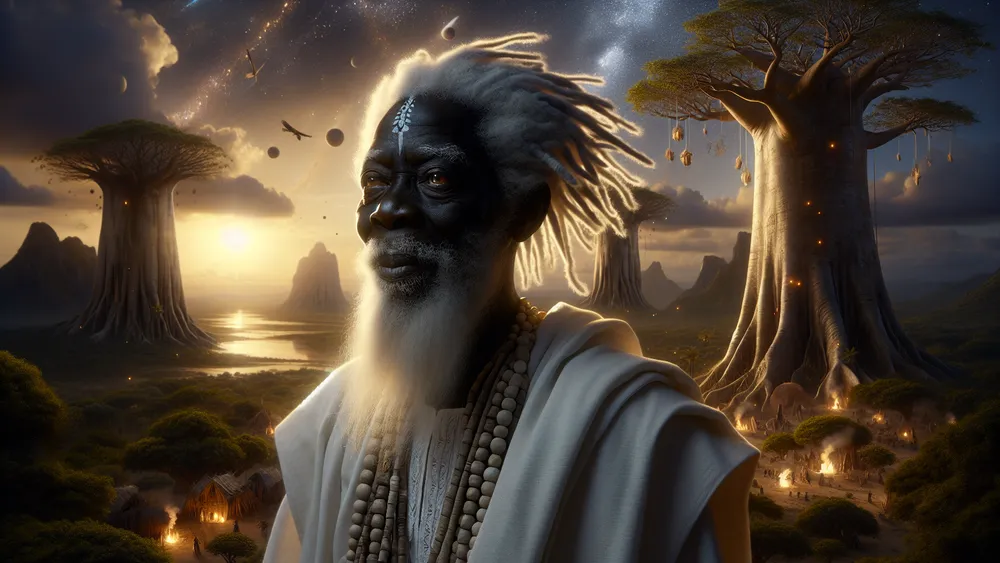
During this exiled time, Obatala changed from an imperfect maker to a wiser, kinder god. Coming from different areas are varied takes – some stress how he made things right, others what he lost forever.
The table below lets us compare how exile changed Obatala:
| Trait | Before Exile | After Exile |
|---|---|---|
| How he acted | Often proud, acted without thinking | More humble, careful in choices |
| Drinking | Drank palm wine often | Never touched alcohol again |
| Main Job | Sky king and creator | Protector of disabled people and judge |
| What he stood for | That went with creating things | That matched cleanliness and fairness |
| Place among gods | Top Orisha | Still honored but with different job |
We can see this fits with how many god stories go, like Greek Prometheus or Egyptian Osiris. Earth living became the big moment of change that gave Obatala new purpose.
What Obatala Represents
Having looked at Obatala’s tales, we should see what he stands for in Yoruba people’s beliefs, both holy colors and nature parts. These mean much.
The Meaning of White Cloth and Purity
In Yoruba ways, how Obatala links to purity appears through certain holy items that hold much meaning – white cloth works like a clean surface spiritually, never dirtied, and these important things include several objects each telling something different. What these things tell us:
- White cloth: Means being morally clean and Obatala’s promise to stop drinking after his mistake
- Silver: Stands for how the moon reflects and wisdom
- Snails: Their slow, careful moving matches Obatala’s thinking way after his exile
- White kaolin clay: People use in rituals, that makes us think of his making humans from dirt
- Coconut water: The clear liquid means spiritual clearness
We can observe white rules Obatala’s symbols like light through glass – it breaks apart his main ideas of wisdom, calm, and fixing mistakes. These color meanings come up across Yoruba spiritual doings, where white clothes in ceremonies make a special area apart from everyday things, like hospitals do with white.
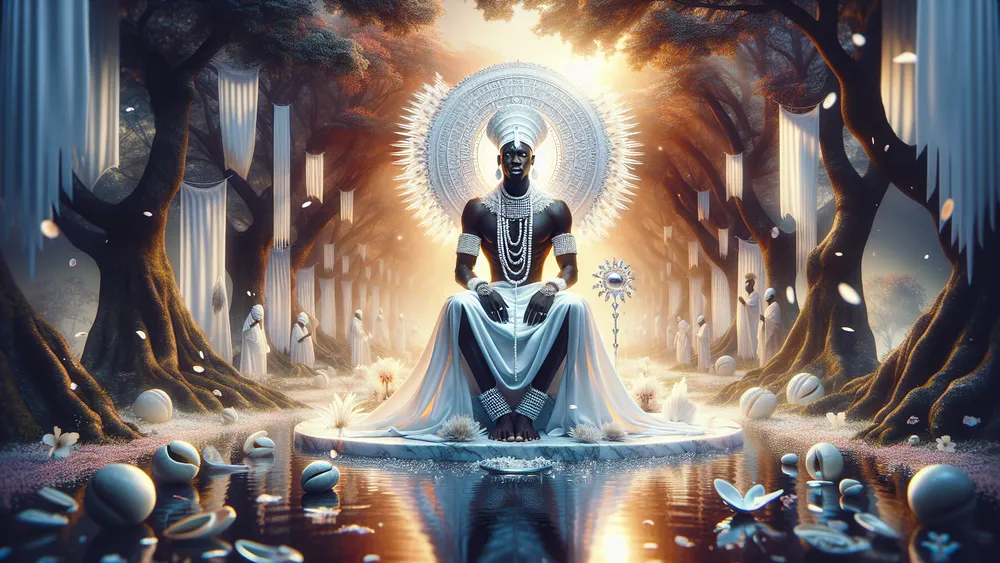
Coming from different places are small changes (some add white feathers or pearls), but the purity link stays the same in spread-out communities.
Animals and Plants Sacred to Obatala
White and peaceful, the dove works as Obatala’s main holy animal, working like holy message-bringers in other beliefs – their white feathers match his clean nature, while their calm way matches the peace he has after changing, and people often notice palm trees seen clearly in Obatala’s ceremonies, acting like bridges between worlds, their strong trunks meaning the steady wisdom he got during exile, their wine (now not used) making people think of his errors.
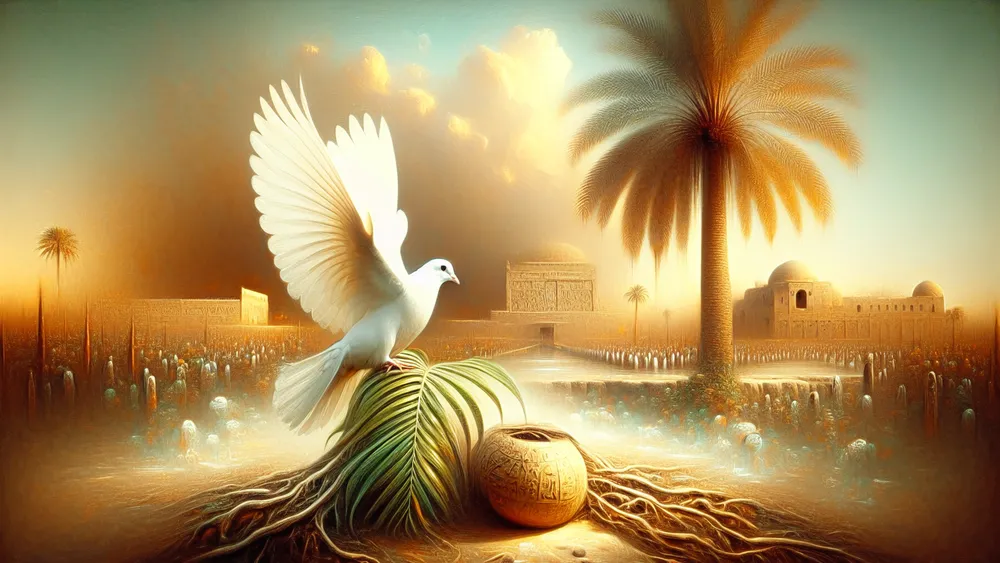
What becomes clear is other area customs link Obatala with white elephants (that mean memory and wisdom) or certain white blooms, but the dove and palm tree stay his same everywhere holy signs across Yoruba faraway groups.
How People Honor Obatala
Now that we know about Obatala’s holy signs, we’ll look at how followers turn this respect into real actions through gifts, words to gods, and ceremonies that happen regularly in certain ways. These matter.
Common Gifts and Prayers
Followers give Obatala things that match his clean nature, like giving pale gifts to someone important dressed in white, and these holy offerings include several white foods and objects each meaning something different about purity and wisdom and clear thinking. Included are:
- White foods: Rice, coconut, yams, and white cornmeal (eko) meaning purity
- Coconut water: The clear liquid standing for clear thinking
- White flowers: Especially lilies or jasmine because they look clean
- Silver coins: Showing Obatala’s wisdom
- Fresh water: Often in white porcelain containers for cleaning ceremonies
What happens is during Obatala’s festival (usually in September), people often see detailed cleaning ceremonies where followers wear only white, like doctors getting ready for surgery. The events normally start at sunrise with washing Obatala’s holy items, then come walking groups carrying white cloth flags and gifts up high. In some places, new members go through a 16-day period of not having drinks and dirty foods first, matching Obatala’s own change after being sent away.
The festival ends with shared meals that have white foods, where words asking for wisdom and clear thoughts are said out loud in Yoruba, to keep old spoken ways alive. All are white.
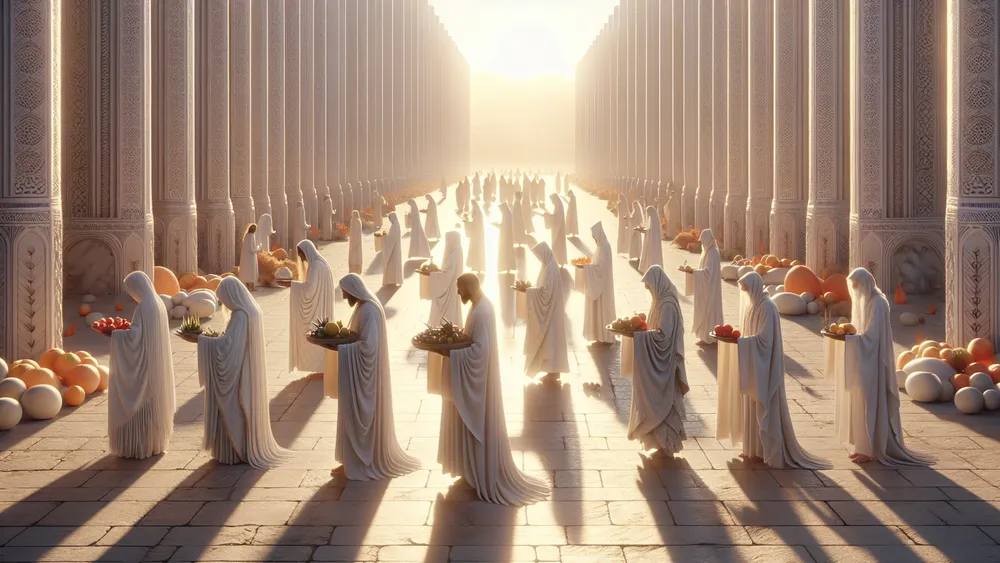
Things You Should Never Do
What becomes clear is people see strict things not allowed that act like holy lines not to cross, similar to fences around a holy place – the same everywhere being drinking alcohol, directly pointing to his story-like error of making people with flaws while drunk, and followers usually stay away from anything that changes the mind, lies that make thinking unclear like alcohol once did for Obatala, and angry actions since these go against his changed calm way after being sent away.
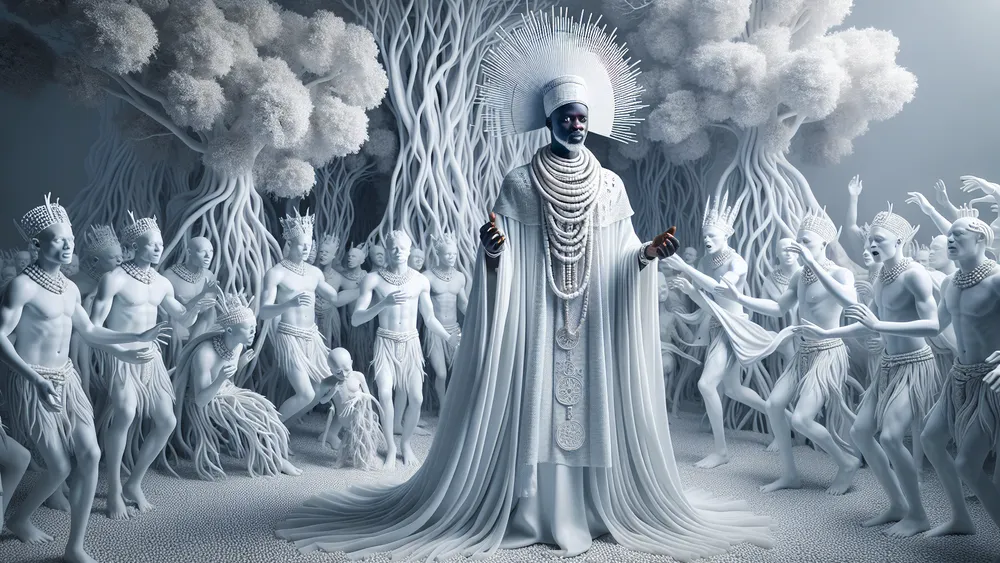
Looking across places, some groups add more rules like eating salt (standing for keeping old things) or wearing black clothes during ceremonies, though ways change by area – in Cuba, certain groups don’t eat pork when dealing with Obatala.
These limits aren’t just orders but daily memories of Obatala’s path from maker with faults to smart old one, with every rule standing for a teaching from his stories that followers live out every day. Some differ.
People avoid alcohol, mind-altering things, and anger to follow Obatala’s calm example, with extra rules like no pork or salt in some places.
The Yoruba Gods and Goddesses
What must be said is while we’ve talked mostly about Obatala, the Yoruba group of gods has many other important gods, all having different areas they rule and tales about them that explain what they do and why people worship them in particular ways with special ceremonies and rules. More exist.
For those wanting to look into the whole range of African gods, we point to this complete list of all the African Gods that gives lots of facts about the thick fabric of African god stories.
FAQs
1. Is Obatala the same as the Christian God?
Obatala is not the same as the Christian God, as they belong to different religious traditions – Yoruba mythology and Christianity, respectively.
2. Why is Obatala associated with disabilities?
Obatala is associated with disabilities because, in Yoruba mythology, his intoxication while sculpting humans from clay resulted in some being born with physical imperfections.
3. How is Obatala worshipped today?
Obatala is worshipped today through rituals involving white offerings, prayers for purity, and annual festivals like the Obatala Festival in Nigeria.
4. What’s the connection between Obatala and Oshun?
The connection between Obatala and Oshun stems from their complementary roles in Yoruba creation myths, where Obatala molds humans and Oshun breathes life into them.

